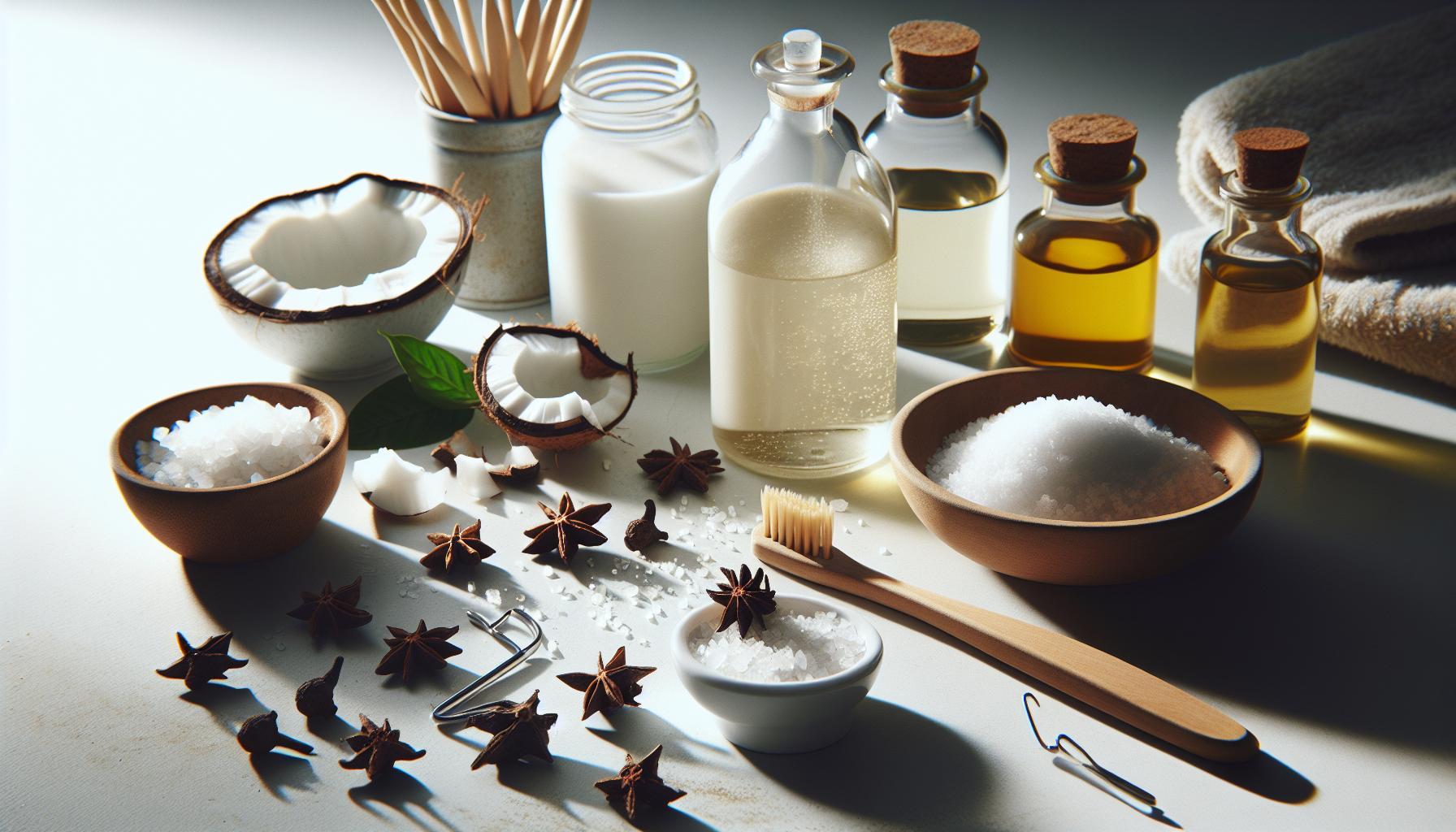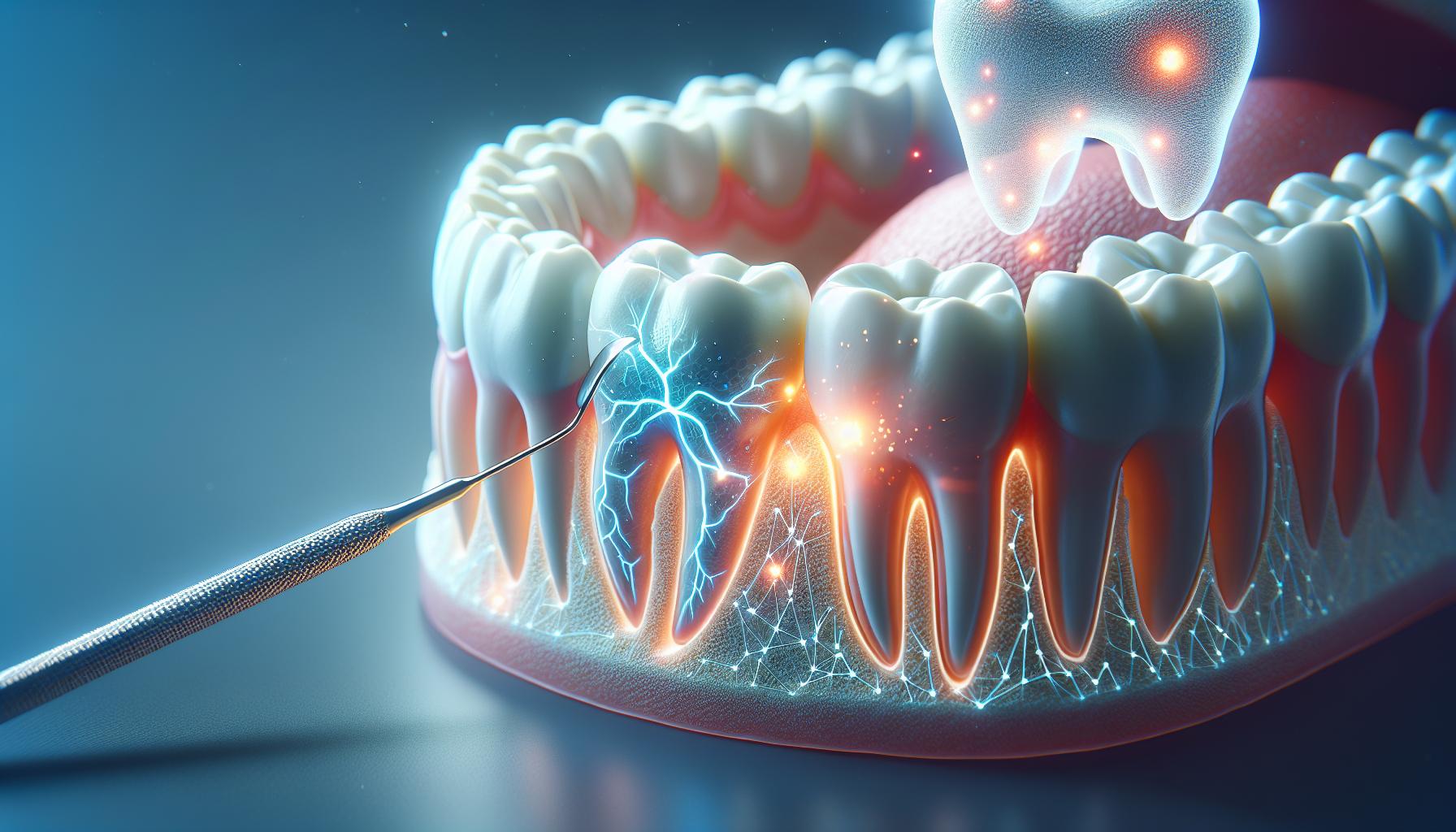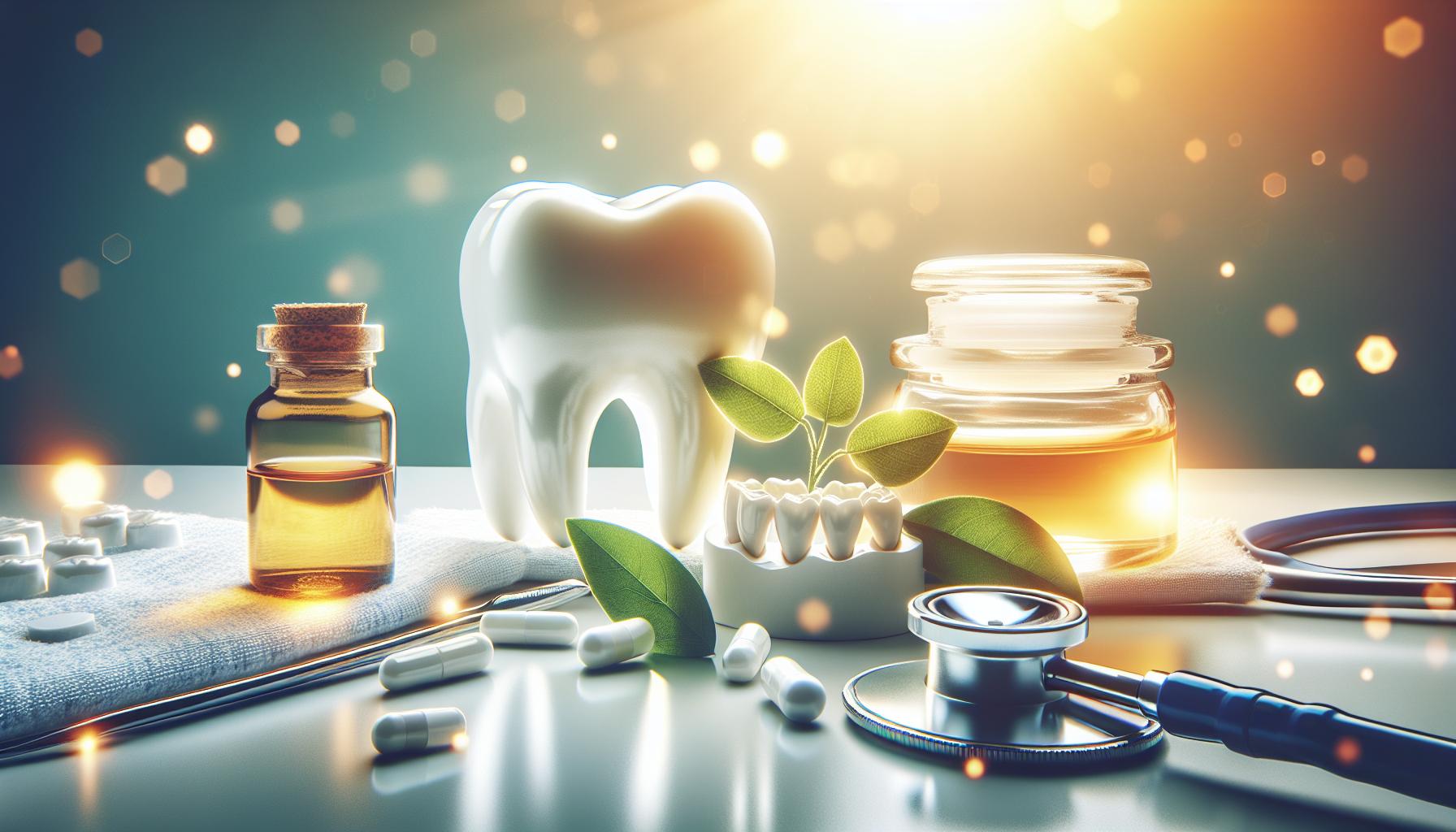Cavities can be more than just a dental nuisance; they signify a battle against harmful bacteria adn poor oral hygiene. Fortunately, several natural remedies can definitely help remineralize teeth and perhaps reverse early-stage decay. Exploring these home treatments not only empowers you to take charge of your dental health but also highlights alternatives for those seeking holistic approaches to cavity care.
sure! Here are some engaging and relevant H2 headings for your article:
Did you know that nearly 92% of adults have suffered from cavities at some point in their lives? While visiting a dentist for treatment is essential, there are also natural remedies you can try at home to address minor cavities and improve your oral health. Below, we explore insightful headings that will guide your readers through effective methods to tackle cavities naturally.
Understanding tooth decay: the First Step to Prevention
Before diving into remedies, it’s important to understand how cavities form.Reading about the causes of tooth decay empowers readers to take preventive measures. Highlight factors such as poor dental hygiene, high sugar consumption, and lack of fluoride.
Top Natural Remedies for Fixing a Tooth Cavity
This section could offer actionable solutions.Readers will appreciate practical tips they can implement immediately.Consider discussing:
- Oil Pulling: Explore how this ancient practice may help in reducing plaque and preventing cavity formation.
- Clove Oil Applications: Share how clove oil’s natural anesthetic properties can reduce pain while potentially aiding dental health.
- dietary Changes: Suggest foods rich in calcium and phosphorus that help remineralize teeth.
Step-by-Step Approach to Healing Minor Cavities
Offering a simple,step-by-step guide can be incredibly helpful. Create an easy-to-follow process that includes daily oral care routines, suggested natural remedies, and when to seek professional help. This empowers your audience to take charge of their oral health.
When to Consult a Professional
While manny at-home remedies provide relief, it’s crucial to educate readers on recognizing signs that require a dentist’s attention. Include symptoms such as persistent pain, sensitivity, or visible decay that warrant professional evaluation.
| Symptom | Action |
|---|---|
| Pain when biting | Consult a dentist for evaluation |
| Persistent sensitivity | Consider using desensitizing toothpaste and make an appointment |
| Visible holes or stains | Seek professional dental advice |
These engaging headings not only stimulate interest but also prepare readers with knowledge and practical steps to address cavities naturally.
Understanding Tooth Cavities: What You Need to Know
Tooth cavities, also known as caries or dental decay, affect millions of people worldwide and are a common dental concern. Each cavity forms when harmful bacteria in the mouth produce acids that demineralize tooth enamel, leading to the creation of a hole in the tooth.Understanding the underlying causes and prevention methods is essential to combat this issue effectively.
### The Role of Diet in Tooth Cavity Formation
Diet plays a crucial role in the progress of tooth cavities. Foods that are high in sugars and phytic acid can contribute to cavity formation by providing fuel for the bacteria that generate harmful acids. To combat decay, it is vital to limit the intake of sugary snacks and beverages and replace them with nutrient-dense, mineral-rich foods. Implementing a diet that includes adequate amounts of calcium,phosphorus,and vitamins A,D,E,and K can enhance tooth health and potentially aid in remineralization efforts.
- Foods to Avoid: Sugary snacks, phytic acid-rich grains, and processed foods.
- Foods to Include: Raw dairy, leafy greens, nuts, and seeds.
### Natural Remedies to Encourage Remineralization
Although established cavities can only be treated by a dentist, there are several natural remedies that may support tooth health and help in the early stages of cavity formation. Incorporating practices such as oil pulling, using mineral-rich toothpaste, and consuming raw dairy can provide beneficial nutrients that help strengthen teeth. Recent studies suggest that these techniques can create an habitat conducive to remineralization, allowing the teeth to heal naturally when cavities are detected early.
### How to Properly Care for Your Teeth
In addition to dietary changes, consistent dental hygiene is paramount in preventing and managing cavities. Though some home remedies can support tooth health, they should not replace conventional practices like regular brushing and flossing. Here are effective habits that can contribute to overall dental health:
- Brush teeth at least twice a day with fluoride toothpaste to prevent acid buildup.
- Floss daily to remove plaque and food particles between teeth.
- Visit the dentist regularly for check-ups and cleanings.
By nurturing your teeth with the right foods and maintaining robust dental hygiene, you can create a solid defense against cavities. Understanding how to fix a tooth cavity at home with natural remedies can empower you to take charge of your oral health, but remember that prevention is always better than cure.
Early signs of Cavities: Identifying Issues Before They Escalate
Recognizing the Early Signs of Cavities
Ignoring the subtle signs of cavities can lead to more serious dental issues down the line. Cavities frequently enough begin as small, often unnoticeable changes in your teeth, but early intervention can prevent them from escalating into significant dental damage. By understanding the initial indicators, you can take proactive steps on how to fix a tooth cavity at home with natural remedies.
One of the first symptoms to look out for is increased sensitivity. If you notice discomfort while consuming hot, cold, or sweet foods, this may be an important warning sign of tooth decay. Moreover, watch for any unusual tooth pain or discomfort that seems localized to a specific area. Tooth discoloration, especially dark spots or shades of brown, can also indicate the presence of cavities. Regular self-exams can help catch these changes before they become more severe. Consider performing a simple visual check of your teeth at least once a week to see if you notice any changes.
Additionally, bad breath that persists despite good oral hygiene can suggest deeper oral health issues, including cavities. If your breath has an unusual odor, it may be a sign that decay is forming beneath the surface. In this case, immediate adjustments to your dental care routine, such as increased brushing and rinsing, can be effective in managing the problem.
Actionable Steps to Monitor Dental Health
To better identify the early signs of cavities and establish effective preventive measures, consider the following actions:
- Regular Self-Exams: Use a small mirror to inspect your teeth every week, focusing on hard-to-see areas such as the back molars.
- Eat a Balanced diet: Limit sugary snacks and drinks, opting instead for foods rich in vitamins and minerals that support dental health, such as fruits, vegetables, and dairy.
- Maintain Good Oral Hygiene: Brush twice a day with fluoride toothpaste, and floss daily to remove plaque and food particles.
- Stay Hydrated: Drink plenty of water,especially fluoridated water,to help wash away food particles and reduce bacteria in the mouth.
By staying vigilant and responsive to the early signs of cavities, you can effectively manage and prevent the escalation of decay, utilizing natural remedies to enhance your dental health.
Natural Remedies for Tooth Decay: What Works and Why
Tooth decay can be a distressing experience, but many individuals seek natural ways to address this common issue. Understanding how to fix a tooth cavity at home with natural remedies involves knowing which methods are effective and why they work. These remedies not only combat the bacteria responsible for decay but also promote overall oral health.
Understanding Tooth Decay
Tooth decay begins with the demineralization of enamel caused by acids produced by bacteria feeding on sugars in the mouth. Once the enamel is compromised, the decay can progress to the underlying dentin. This is where natural remedies come into play, offering a way to remineralize the enamel and reduce further damage.
Effective Natural remedies
Here are several natural strategies that have shown promise in managing and potentially reversing tooth decay:
- Oil Pulling: This ancient technique involves swishing oil (such as coconut or sesame) in your mouth for 15-20 minutes. It helps remove harmful bacteria and strengthens gum health.
- Neem: known for its antibacterial properties,neem leaves can be chewed directly or used as a mouthwash to combat decay-causing bacteria.
- Clove Oil: Rich in eugenol,clove oil serves as a natural analgesic and antibacterial agent. Applying it to affected areas can alleviate pain and fight infection.
- Green Tea: With high levels of catechins, drinking green tea can definitely help reduce bacterial growth in the mouth, thus lowering the risk of cavities.
- Dietary Adjustments: Incorporating foods rich in calcium and phosphorus, such as dairy products, nuts, and leafy greens, can support enamel remineralization while minimizing sugars and processed foods.
Why These Remedies Work
The effectiveness of these natural remedies can be attributed to their ability to either inhibit bacterial growth or promote the remineralization of tooth enamel. As a notable example, oil pulling not only removes bacteria but also encourages saliva production, which is essential for natural remineralization.Similarly, *neem* and *clove oil* provide potent antimicrobial benefits that combat the root causes of decay.
Practical Steps to Implement
To effectively incorporate these natural remedies into your dental care routine, consider the following practical steps:
| Remedy | How to Use | Frequency |
|---|---|---|
| Oil Pulling | Swish for 15-20 minutes, then spit out | Daily |
| Neem | Chew leaves or make a mouthwash | 1-2 times a week |
| Clove Oil | apply to the affected area with a cotton swab | As needed for pain |
| Green Tea | Drink unsweetened | Daily |
| Dietary Adjustments | Incorporate more calcium-rich foods | Ongoing |
utilizing natural remedies for tooth decay can definitely help manage symptoms and promote healing. While these methods can support oral health, it is crucial to maintain a consistent oral hygiene routine and consult with a dental professional for thorough care.
DIY Techniques to remineralize Your enamel
Unlocking the Power of Home remedies for Dental Health
Did you know that your tooth enamel can naturally remineralize, helping to prevent cavities and strengthen your teeth? This occurs when essential minerals are replenished in the enamel structure, and several DIY techniques can effectively support this natural process. By incorporating specific foods and homemade remedies into your daily routine, you can take proactive steps to protect your dental health and enhance enamel remineralization.
Natural Ingredients for Remineralization
Creating your own remineralizing treatments can be both effective and satisfying.here are some natural ingredients that promote enamel health:
- Bone Broth: Rich in minerals, this nourishing liquid provides collagen, calcium, and phosphorus, all essential for remineralizing your teeth.
- Eggshells: Ground eggshell powder can be used as a calcium supplement. Just ensure they are cleaned, sterilized, and finely powdered before consumption.
- Propolis: Known for its antiseptic properties, propolis helps combat harmful bacteria in the mouth and supports enamel health[[2]](https://www.mynaturaltreatment.com/natural-ways-to-remineralize-teeth/).
- Raw Dairy Products: Fermented and raw dairy products are high in bioavailable calcium and phosphates, promoting stronger teeth and gums.
- Bentonite Clay: This mineral-rich clay can be incorporated into homemade toothpaste for its remineralizing properties[[3]](https://draxe.com/beauty/remineralizing-toothpaste/).
Simple DIY Remineralizing Toothpaste Recipe
A practical way to implement enamel remineralization at home is by making your own remineralizing toothpaste. Here’s a simple recipe that incorporates some of the beneficial ingredients mentioned above:
| Ingredient | Amount | Benefit |
|---|---|---|
| Bentonite Clay | 2 tablespoons | Provides essential minerals and promotes remineralization |
| Coconut oil | 2 tablespoons | Antibacterial properties that help keep the mouth healthy |
| Essential Oils (Peppermint or Tea Tree) | 10 drops | Freshens breath and adds flavor |
| Stevia or Xylitol | to taste | Natural sweeteners that are friendly to teeth |
To make the toothpaste, simply mix all these ingredients until you achieve a smooth paste. Use it as you would regular toothpaste, brushing twice a day to help remineralize your teeth naturally.
By implementing these DIY techniques, you’re not only focusing on how to fix a tooth cavity at home using natural remedies but also nurturing your overall dental health. Consistent use of these strategies can contribute to stronger, healthier enamel and a brighter smile.
The Power of Diet: foods that Help Fight Cavities
Tooth decay doesn’t have to be an inevitable part of life. With the right approach, particularly focusing on your diet, you can actively fight cavities and promote healthier teeth. What you consume plays a crucial role in oral health, affecting the bacteria in your mouth and the overall environment conducive to tooth decay. By understanding which foods can aid in combating cavities, you can take empowered steps toward your dental wellness.
Key Foods to Include in Your Diet
A diet rich in specific nutrients can definitely help fortify your teeth against decay. Consider incorporating the following into your meals:
- Dairy Products: Milk, cheese, and yogurt are excellent choices. They are high in calcium and phosphorus, which are essential for strong teeth. Moreover, they help neutralize acids in your mouth, reducing the likelihood of cavities [[3](https://dentistry.uic.edu/news-stories/feed-your-smile-a-menu-of-foods-for-a-healthy-smile/)].
- Fruits and Vegetables: Crunchy fruits and vegetables, particularly apples and carrots, can stimulate saliva production.Saliva is your mouth’s natural defense against cavities as it washes away food particles and neutralizes acids [[1](https://askthedentist.com/foods-heal-cavities/)].
- Whole Grains: Whole grains provide essential nutrients without the harmful effects of refined sugars found in processed snacks.Their fiber content also encourages healthy digestion, indirectly supporting oral health.
- Leafy Greens: Foods like spinach and kale are packed with vitamins and minerals, promoting overall health, including your oral cavity. They are low in sugar, making them a safe bet for your dental health.
Foods to Avoid
While knowing what to eat is vital, being aware of what to avoid can provide further protection against cavities. They include:
- Sugary Snacks and Beverages: These are primary culprits of tooth decay. Sugary foods feed the bacteria in the mouth, leading to acid production that erodes tooth enamel [[1](https://askthedentist.com/foods-heal-cavities/)].
- Acidic Foods: Citrus fruits, soda, and other highly acidic foods can wear down enamel over time. If consumed, it’s best to follow up with neutralizing foods to counteract their effects [[3](https://dentistry.uic.edu/news-stories/feed-your-smile-a-menu-of-foods-for-a-healthy-smile/)].
- Starchy Foods: Foods such as white bread and chips can crumble and cling to teeth, making them a source of sugar as they break down in your mouth, which can further promote cavity formation [[1](https://askthedentist.com/foods-heal-cavities/)].
Practical Tips for Implementation
To effectively incorporate these dietary changes while working on how to fix a tooth cavity at home with natural remedies, try these actionable steps:
- Practice Food Sequencing: consider the order of your meals. Consuming neutralizing foods, like cheese or nuts, after a sweet dish can mitigate acid attacks on your teeth [[3](https://dentistry.uic.edu/news-stories/feed-your-smile-a-menu-of-foods-for-a-healthy-smile/)].
- Stay Hydrated: Drinking plenty of water,especially after meals,can help wash away food particles and acids.
- Choose Nutrient-Dense Snacks: If you need a snack between meals, opt for nuts, seeds, or yogurt instead of sugary treats to minimize cavity risk.
By embracing a tooth-friendly diet, you substantially enhance your ability to fight cavities and maintain a healthy smile. Every positive dietary choice works in tandem with other remedies, empowering you on the path to dental health.
Effective Oral Hygiene Practices to prevent Further Damage
Did you know that maintaining strong oral hygiene is the most effective defense against the progression of tooth decay? A commitment to good dental care not only protects your teeth but can also reverse early signs of cavities. By incorporating strategic habits into your daily routine,you can significantly reduce the risk of further damage while complementing your efforts to fix tooth cavities at home with natural remedies.
Key Practices for Optimal Oral Health
- Brush Regularly: Use fluoride toothpaste to brush your teeth at least twice a day. Make sure to spend a minimum of two minutes each time, paying special attention to areas where plaque builds up.
- Floss Daily: Flossing removes food particles and plaque from between your teeth and along the gum line, areas that your toothbrush might miss. Aim to floss once a day, preferably before bedtime.
- Limit Sugar Intake: High sugar consumption plays a significant role in tooth decay. Reducing sugary snacks and beverages can slow down cavity development.
- Regular Dental Check-ups: Schedule dental visits at least twice a year for professional cleanings and exams. Your dentist can detect early signs of cavities and provide personalized advice tailored to your oral health needs.
Incorporating Remineralization Strategies
Another vital aspect is to focus on remineralization, which helps to strengthen the enamel and repair early cavities. Consider including the following in your diet:
| Food/Drink | Benefits |
|---|---|
| Cheese | Helps neutralize acids and provides calcium for enamel strength. |
| Nuts | Rich in minerals and promotes saliva flow, which cleanses the mouth. |
| Leafy greens | high in vitamins and minerals that can definitely help strengthen teeth. |
| Green Tea | Contains polyphenols that can reduce bacteria and plaque buildup. |
By adopting these practices in conjunction with natural methods to fix a tooth cavity at home,you can more effectively prevent further damage and maintain a healthy,vibrant smile.Remember, the foundation of oral hygiene is not just about treating existing issues but also proactively preventing new ones from arising.
Herbal Solutions: Exploring Nature’s Dental Aids
Unlocking Nature’s Pharmacy: Herbal Solutions for Dental health
Did you know that some of the most effective remedies for tooth decay and cavities can be found right in your pantry or garden? Natural ingredients, particularly herbs, have been used for centuries to promote oral health and combat dental issues. By integrating these herbal solutions into your dental care routine, you’re not just addressing oral health but also embracing holistic wellness.
One particularly potent herb for tackling tooth cavities is clove. Known for its antibacterial and anti-inflammatory properties, clove oil can help soothe pain and reduce the bacteria responsible for decay.Just a drop of clove oil applied to the affected area can offer significant relief. Another powerhouse is garlic, which has natural antimicrobial effects. crushing a clove and applying it directly to the cavity can help fight off infection, providing a natural pathway to how to fix a tooth cavity at home with natural remedies.
- Clove Oil: Apply directly to the cavity for pain relief and antibacterial action.
- Garlic: Crush a clove and place it near the affected area for its antimicrobial properties.
- Turmeric: Known for its healing properties, turmeric paste can definitely help in reducing inflammation and bacteria.
- Peppermint: Fresh peppermint leaves can subdue pain and freshen breath due to their antibacterial nature.
Creating Your Herbal Approach
Incorporating these herbs into your dental health routine can be straightforward. For instance, making a mouth rinse with saline and turmeric can provide a soothing effect and promote healing.Additionally, drinking herbal teas like green tea not only enhances oral health due to its fluoride content but also serves as a natural cavity fighter.
| Herb | Benefits | How to Use |
|---|---|---|
| Clove | Antibacterial, pain relief | Apply clove oil to the cavity |
| Garlic | Antimicrobial | Crush and apply near the cavity |
| Turmeric | Reduces inflammation | Make a paste and apply to the tooth |
| Peppermint | Freshens breath, antibacterial | Chew fresh leaves or use as a tea |
Implementing these remedies as part of your strategy for how to fix a tooth cavity at home with natural remedies not only provides immediate relief but can also promote long-term oral health. Always consult your dentist if symptoms persist or worsen, as professional intervention may still be necessary.
When to Seek professional Help: Knowing Your Limits
The journey to maintaining dental health can sometimes present challenges,especially when dealing with the onset of tooth cavities. While many natural remedies can be effective in reversing early stages of tooth decay, understanding the limits of self-treatment is crucial. Recognizing when to seek professional help can make the difference between preserving your dental health and facing more severe consequences.
Identifying the Signs of Advanced Decay
When considering how to fix a tooth cavity at home with natural remedies, it is indeed essential to be vigilant about the symptoms that suggest the need for professional intervention. If you experience any of the following symptoms, it may indicate that the cavity has progressed beyond the scope of home remedies:
- Severe Pain: Intense discomfort that persists even when not eating can signal that decay has reached deeper layers of the tooth.
- Swelling or Sensitivity: Noticeable swelling in your gums or sharp sensitivity to hot or cold should not be ignored.
- Visible Holes or Dark Spots: If you discover visible damage on your teeth, especially dark stains, this could mean the decay is extensive.
- Persistent Bad Breath: This could be a sign of infection, suggesting a need for immediate dental care.
Ignoring these signs can lead to complications, including infections that may require more invasive treatments than simply filling a cavity.
The Role of Professional Treatment
While home remedies like using remineralizing toothpaste or natural antibacterial agents can be beneficial in early-stage cavities, certain conditions necessitate the expertise of a dental professional. Dentists can provide treatments such as fluoride applications or sealants that help further protect and heal your teeth. Here’s when to consider visiting your dentist:
- If home remedies have not alleviated pain or reversed decay after a few weeks.
- For comprehensive evaluation and treatment options if your dental health appears to be deteriorating.
- When you are experiencing recurrent cavities or other oral health issues that require a tailored approach.
Ignoring the professional treatment needed can escalate the damage, leading to root canals, extractions, or other more serious health conditions.
Conclusion: Know When to Act
While there are many strategies to fix a tooth cavity at home with natural remedies,knowing your limits is pivotal to maintaining your dental health. It’s wise to use these remedies as part of a broader oral care routine while being attuned to your body’s signals. Regular dental visits can help prevent decay from worsening and ensure that your mouth remains healthy and free from complications.When in doubt, consulting with a dentist is the best course of action to safeguard your dental health.
Building Long-Lasting dental Health: Sustainable Practices for Everyone
Embracing Natural Solutions for Dental Health
Did you know that the mouth is a window to your overall health? Maintaining optimal oral hygiene is not just about preventing cavities but also about fostering a sustainable lifestyle. Many individuals are seeking ways to address dental issues such as cavities through natural remedies, paving the way for a more holistic approach to oral health. Emphasizing the connection between sustainable practices and dental care can empower everyone to take charge of their dental health while minimizing environmental impacts.
When exploring ways to fix a tooth cavity at home with natural remedies, it’s essential to integrate sustainable practices that benefit both your health and the planet. here are some effective strategies:
- Dietary Choices: Incorporate a diet rich in whole foods, focusing on fruits, vegetables, and whole grains. Natural foods can help bolster oral health by providing essential nutrients.
- Natural Tooth Remineralization: Utilize ingredients such as clove oil and coconut oil for their natural antibacterial properties. These remedies not only help in cavity treatment but are also sustainable, promoting less waste than conventional dental products.
- Homemade Toothpaste: consider crafting your own toothpaste using baking soda and essential oils. This minimizes reliance on plastic tubes and chemicals, promoting a more eco-friendly dental hygiene routine.
Real-World Examples of Sustainable Dental Practices
Implementing sustainable practices in oral health care extends beyond home remedies. By choosing eco-conscious dental products,individuals can contribute to a healthier planet.Here are some practical examples:
| Product Type | Sustainable Option |
|---|---|
| Toothbrush | Bamboo toothbrushes or biodegradable options |
| Floss | Silk floss or refillable floss containers |
| Whitening Products | Activated charcoal or natural whitening powders |
These sustainable alternatives not only help in enhancing overall dental health but also reduce waste and promote a chemical-free environment. By committing to these practices alongside natural remedies for fixing cavities, individuals can foster long-lasting dental health that is beneficial for both their well-being and the planet.
Empower Yourself: Taking Action Against Tooth Decay at Home
Tooth decay is a common issue that affects millions around the world, but with the right knowledge and proactive measures, you can take control of your dental health from the comfort of your own home. By adopting natural remedies alongside diligent oral hygiene, you can effectively combat cavities and minimize discomfort.
Natural Remedies for tooth Decay
Using substances that are found in your kitchen,you can create a robust defense against tooth decay. Consider incorporating the following methods into your daily routine:
- Oil Pulling: Swishing coconut or sesame oil in your mouth for 10-20 minutes can definitely help expel harmful bacteria while also freshening your breath.
- Clove Oil: Known for its natural analgesic properties, clove oil can be applied with a cotton ball to soothe pain and inflammation associated with cavities.
- Garlic: This kitchen staple contains allicin, which has antibacterial properties. Crushing a clove and applying it to the affected area can help reduce bacterial growth.
- Salt Water Rinse: Regularly rinsing your mouth with a warm saltwater solution can aid in reducing inflammation and preventing infection.
These remedies serve not just as a way to manage existing decay but also as preventive measures that can empower you to maintain oral health.
Consistent Oral hygiene Practices
In addition to natural remedies, developing a consistent oral hygiene routine is vital in your fight against tooth decay. Start with the foundational practices:
- Brush your teeth at least twice a day using fluoride toothpaste to help remineralize enamel.
- Floss daily to eliminate food particles and plaque from between your teeth, areas where your toothbrush can’t reach.
- Limit sugary foods and beverages, which can contribute to cavity formation.
- Stay hydrated to help wash away food particles and bacteria.
By combining these practices with natural remedies, you can effectively manage and even reverse early signs of tooth decay.
Monitor Your Progress
Maintaining awareness of your dental health is key to long-term success. Schedule regular dental check-ups, but also consider keeping a personal dental journal. Documenting your home care routine and any improvements or changes in sensitivity can definitely help you and your dentist identify effective strategies. You might consider tracking:
| Practices | Frequency | Notes/Results |
|---|---|---|
| Oil pulling | Daily | @Mention any observations here |
| Clove Application | As Needed | @Mention any observations here |
| brushing | Twice Daily | @Mention any observations here |
| Flossing | Daily | @Mention any observations here |
By taking proactive steps and integrating these natural remedies into your daily life,you can significantly improve your oral health and mitigate issues related to tooth decay. Empower yourself with knowledge and action, reinforcing your commitment to a healthier smile.
Frequently asked questions
How to Fix a tooth Cavity at Home with Natural Remedies?
You can use several natural remedies to help improve symptoms of tooth cavities at home.While these methods may support oral health, visiting a dentist for treatment is essential as they cannot fully repair cavities.
Common remedies include increasing your intake of vitamin D and calcium through foods like dairy, using mineral-rich toothpaste, and practicing oil pulling to help reduce bacteria. Though, these methods should supplement, not replace, professional dental care.
what are some effective natural remedies for cavities?
Effective natural remedies for cavities include vitamin D-rich foods, oil pulling, and raw dairy products. These can promote remineralization and improve overall oral health.
For example, oil pulling involves swishing coconut or sesame oil in your mouth to reduce harmful bacteria, while vitamin D is essential for calcium absorption, crucial for maintaining strong teeth and bones.
Can I realy reverse a cavity naturally?
While complete reversal of cavities is unlikely, improving your diet and oral hygiene can prevent further decay and strengthen enamel. Incorporating nutrient-rich foods, such as raw dairy, helps.
Research indicates that a balanced intake of calcium, magnesium, and phosphorus can support tooth remineralization. Though, for any significant decay, consulting a dental professional is necessary.
Why do cavities form?
Cavities form primarily due to a combination of factors including poor hygiene,diet high in sugar,and lack of essential nutrients. Bacteria in the mouth convert sugar into acid, which erodes tooth enamel.
Inadequate minerals in your diet, particularly calcium and vitamin D, can exacerbate the risk of tooth decay. Ensuring you maintain good dental hygiene and a balanced diet is crucial for cavity prevention.
When should I seek professional help for a cavity?
You should seek professional help if you experience persistent tooth pain, visible holes in your teeth, or sensitivity to hot or cold. These symptoms indicate that the cavity might potentially be progressing.
While natural remedies can be beneficial, they do not replace professional dental care. Dentists can provide effective treatments, including fillings, to restore the integrity of your teeth.
Can oil pulling really help with cavities?
Yes, oil pulling can definitely help reduce harmful bacteria and improve oral hygiene, potentially supporting cavity prevention. However, it is not a cure for existing cavities.
This ancient practice involves swishing oil, like coconut or sesame, in your mouth for about 15-20 minutes. Many people find it enhances their overall oral health when combined with regular dental care.
What foods should I avoid to prevent cavities?
To prevent cavities, avoid sugar-rich foods and beverages, as well as those high in phytic acid, such as processed grains and legumes. These can hinder tooth remineralization.
Instead, focus on consuming whole, nutrient-dense foods. This approach supports oral health by providing essential vitamins and minerals that strengthen tooth structure.
Final Thoughts
addressing tooth cavities naturally can empower you to take control of your dental health. By incorporating remedies such as licorice root for its antibacterial properties, turmeric for its anti-inflammatory effects, and embracing a diet rich in minerals and fat-soluble vitamins, you can create an environment conducive to remineralizing your teeth [1[1[1[1][2[2[2[2][3[3[3[3]. Remember to reduce sugar intake and avoid phytic acid-rich foods that may contribute to decay. While these natural remedies can be effective, they should complement regular dental check-ups and professional care when necessary.For a healthier smile, explore these options and consider making small, sustainable changes to your routine. Your teeth will thank you!








